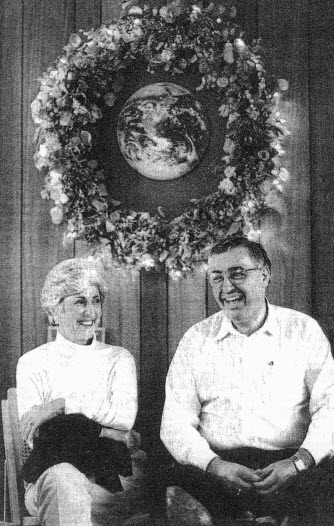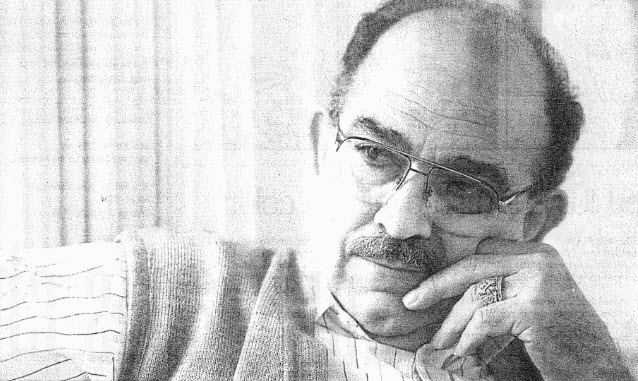
June Levin, a Hillsborough Jew, sits next to Nadim
Zarour, a Palestinian Christian, in San Mateo.
peace through dialogue

Elias Botto, a Palestinian garment manufacturer,
listens during a talk between Arabs and Jews
in San Mateo.
 June Levin, a Hillsborough Jew, sits next to Nadim Zarour, a Palestinian Christian, in San Mateo. |
peace through dialogue |
 Elias Botto, a Palestinian garment manufacturer, listens during a talk between Arabs and Jews in San Mateo. |
THIS IS
not a familiar sight: 14 Jews and Palestinians sitting in a living room, schmoozing, laughing, enjoying one anotherís company. They keep things civil, even as they argue their way through topics as difficult as West Bank settlements, the status of Jerusalem, Hamas-inspired bombings and Israeli military occupation.
Theyíve have a lot of practice. The men and women gathered in San Mateo are part of a 5-year-old "Jewish-Palestinian Living Room Dialogue Group" thatís met more than 60 times in Peninsula homes. Itís an experiment, albeit a modest one, that seems to work. When hot-button subjects threaten to derail the slow, steady progress they make in conversation, they remember that Christians, Muslims and Jews all share a common ancestry: "I am your half-brother," Elias Botto, a Bethlehem-born Catholic, says to the Jews in the room, "and Abraham is our father. Letís dwell on that."
Tonight, the dialogue group, which has 30 members altogether, is co-sponsoring a sold-out dinner at the Clarion Hotel in Millbrae. More than 420 people - almost all Palestinians and Jews - are expected to attend the affair, also sponsored by the Palestinian American Congress and the Jewish Community Relations Council. Organizers claim it will be the largest Jewish-Palestinian event ever held in the United States. Among those attending will be visitors from Neve Shalom/Wahat al-Salaam (Hebrew and Arabic for "Oasis of Peace"), an experimental Israeli community where Jews and Arabs have lived and educated their children together for 25 years.
The dialogue group promotes the "public peace process," a term coined by Harold Saunders, assistant secretary of state under President Jimmy Carter and negotiator of the Camp David accords. Proponents of the process say that peace can be brokered by governments, but that new ideas and energy come from peace-mined citizens. If people learn to talk to one another, say dialogue group members, and if the Peninsula dialogue group teams with other Jewish-Palestinian dialogue groups in the region and country, then a new voice can emerge that will invigorate government-brokered solutions in the Mideast.
The groupís members are hopeful but not naive, because keeping their living room conversations moving has been hard work. Maintaining hope that governments can somehow make peace is an act of faith.
Most of the groupís Palestinian members are Christians; Muslims have tended to drop in and out. Both Jews and Palestinians have lost friends and been criticized in their respective ethnic communities as well-outs and traitors for participating. Over the years, as emotional topics have been exposed, Jewish and Palestinian members have quit in anger and frustration.
Those who remain tend to agree on important policy issues: The group almost unanimously supports the establishment of an independent Palestinian state and an end to the expansion of Israeli settlements in Gaza and the West Bank. Given the volatile and often violent political climate in the Middle East these days, these positions seem ever more contentious to many observers.
Through their conversations, members say they have gradually cleared away stereotypes and gained some understanding of one anotherís cultural perspectives: "Itís only when we came together face to face, and heard each otherís stories, that we were really able to change our hearts and minds," says Len Traubman, a dentist who is Jewish. His wife, Libby, is a longtime proponent of non-violent conflict resolution and a founding member of the group.
BE AS 1
Wednesday, the 14 members met at the Traubmansí home in San Mateo, where thereís a mezuzah on the door and a Toyota in the driveway with a license plate that says, "BE AS 1."
But the meeting doesnít have the saccharine flavor of groups that settle for easy commonalties. Nadim Zarour, a businessman born in the West Bank town of Ramallah, says that next yearís ceremonies marking the State of Israelís 50th anniversary should not be held in Jerusalem. Whatís more, the Palestinian American Congress, of which Zarour is treasurer, will discourage U.S. dignitaries from attending. The ceremonies should be moved, he says. Otherwise, they will bolster the Israeli government position that Jerusalem should remain the Jewish stateís undivided capital.
During the meeting, Eric Gattmann, a Jewish Holocaust survivor and emeritus professor of world affairs at the College of San Mateo, describes Israeli Prime Minister Benjamin Netanyahu as a "prisoner of his coalition" and unable to make "bold decisions."
This is a very strong, gutsy statement, Eric," says Adham Y. Salem, a delicatessen owner who grew up in Ramallah, where his family has lived since the 1500s.
The group has some real veterans. Zarour began participating in Palestinian-Jewish dialogue groups in 1973, after the Yom Kippur Way, when he lived in Berkeley. In those days, it was a "no-no" to join. "Almost nobody got involved," he says.
The groups all tended to fall apart, adds Libby Traubman. "They didnít know how to push through the tension and the pain."
The Peninsula group has found a way to preserve itself: Members fight over issues, without insisting that one position is right and another wrong. If a debate grows too bitter, it is set aside for a time. Then the group focuses on one of the projects it has taken on over the years. These have included collecting medical equipment for a hospital in Gaza and money for a womenís hospital in Jerusalem. The group has also raised funds for schools in the Israeli village of Netanya and the West Bankís Ramallah, where most of the groupís Palestinian member were born.
Settlements a sticky issue
Discussing West Bank settlements near his old home, Zarour says Jewish settlers should have the option of leaving or living "under Palestinian rule" once a Palestinian state is established. This seems to grate a bit on June Levin, a Jewish educator. She opposes settlements, but wonders how Israel can agree to turn back the land to the Palestinians while terrorist bombings continue.
"But the U.N. resolutions all talk about secure borders," Zarour tells her. "Once thereís real peace, there should be no need for someone to make a bombing in Jerusalem or anywhere else."
"Nadim, youíre talking rationally," Levin responds. "But thereís nobody there who seems able to control the terrorism."
Zarour says there are "crazy people on both sides." Then Nahida Salem, also from Ramallah, describes her familyís visit to the West Bank in June: "The settlers, there having a nice backyard with beautiful swings for their kids. And you see Palestinian kids standing behind wires across the street, watching their freedom...If the settlements keep going on, there wonít be peace."
"Youíre not getting the flavor here of the Jewish fear over the bombings," interjects Don Stone, Jewish and a retired neurologist. "I talk to lots of my friends. The first thing they say is, ĎAs long as thereís bombings, there will never be peace.í The Palestinians say, ĎAs long as thereís no peace, there will always be bombings.í"
"Peace must be done, thatís all," says Adham Salem, Nahidaís husband. "The Israeli soldiers, they donít want to be in the streets stopping people for stupid things. They want to be home with their families." Itís scary for both sides," says his wife. "If my sister wants to go from Bethlehem to Ramallah, she has to sneak, and she knows that if sheís caught, she goes to jail."
"And the Jew who wants to eat in a cafeteria in Jerusalem should be able to do it without begin afraid of a bomb," Stone counters, gently.
Thereís the sense that the group has been down these avenues before. As the meeting winds down, Hilde Gattmann, another Jewish members, says Fanny Botto, a Palestinian member raised in Chile, "bakes the best Hanukkah cookies you ever tasted."
"We like each other," Botto says. "We love each other says Gattman. "Now youíre taking it too far!" says Basem Totah, a Ramallah-born businessman, and the whole group bursts out laughing.